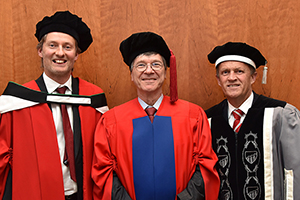Latest News Archive
Please select Category, Year, and then Month to display items
24 July 2024
|
Story Lacea Loader
![]()
The University of the Free State (UFS) is co-hosting the Global Social Innovation Indaba together with Social Innovation Exchange (SIX) on its Bloemfontein Campus from 30 September to 2 October 2024. This event brings together people from different sectors all over the world to discuss how to accelerate and support people-powered
change and create a better society for generations to come.
The UFS is excited to collaborate with SIX, as its vision and values overlap. During this three-day indaba, aspects such as – what it takes to build accountable, inclusive, and participatory institutions, specifically the future role of universities in South Africa – will be discussed. Themes to be explored include young people as drivers of change, post-industrial transitions and community resilience, the role of art, social change and bridging divides, and systemic approaches to dealing with unemployment.
Some of the speakers and participants in the programme include Carla Duprat from ICE (Brazil); Cheryl Jacob from ESquared Investments (South Africa); François Bonnici from the Schwab Foundation for Social Entrepreneurship (Switzerland); Sir Geoff Mulgan from the University College London (UCL) in the United Kingdom; and Dr Narissa Ramdhani from the Ifa Lethu Foundation (South Africa).
The UFS will also use the opportunity to showcase its campus and offerings to attendees, focusing on its transformation story and some of the interdisciplinary forward-thinking programmes. Guests will also be treated to true South African hospitality, laying the foundation for strong relationships and collaboration.
SIX believes in the transformative power of people working together. Exchanges based on mutual value and reciprocity are the missing link in tackling the world’s problems. As a friendly, expert entry point to global social innovation, their work connects organisations, sectors, communities, and nations to build capabilities and create opportunities for collaboration.
Prof Jeffrey Sachs presented with honorary doctorate at Spring Graduation Ceremony
2015-10-01

Prof Jeffrey Sachs (centre) with Prof Philippe Burger,
Head of Department: Economics (left), and
Prof HJ Kroukamp, Dean of the Faculty of Economic and
Management Sciences (right).
Photo: Charl Devenish |
“Quality education is the best accelerator for sustainable growth. Universities have a unique role to play in this regard,” Prof Jeffrey Sachs said during a lecture he presented at the University of the Free State (UFS) Faculty of Economic and Management Sciences. He gave an insightful overview of the new Sustainable Development Goals (SDGs) of the United Nations. The 17 SDGs replace the Millennium Development goals of the past 15 years. In a major achievement, 193 countries will sign the goals at the United Nations (UN) in New York on 25 September 2015.
Prof Sachs is the director of The Earth Institute, Quetelet professor of Sustainable Development, and professor of Health Policy and Management at Columbia University. He is also a special advisor to the UN Secretary-General Ban Ki-moon on the Millennium Development Goals, and director of the UN Sustainable Development Solutions Network. Another accolade now added to his résumé is an honorary doctorate in Economics conferred on him by the UFS at the Spring Graduation Ceremony on 17 September 2015 for outstanding achievements and contribution to academia.
“South Africa is not achieving sustainable development. It has the highest inequality in the world with high unemployment among the youth. Quality education is the best accelerator for growth,” Prof Sachs said. He used the high education investment in Korea as an example of that country’s growth. Prof Sachs added that the government cannot achieve the SDGs on its own. “It is important for the country and universities to take on the goals. Universities can apply pressure, influence and provide solutions.”